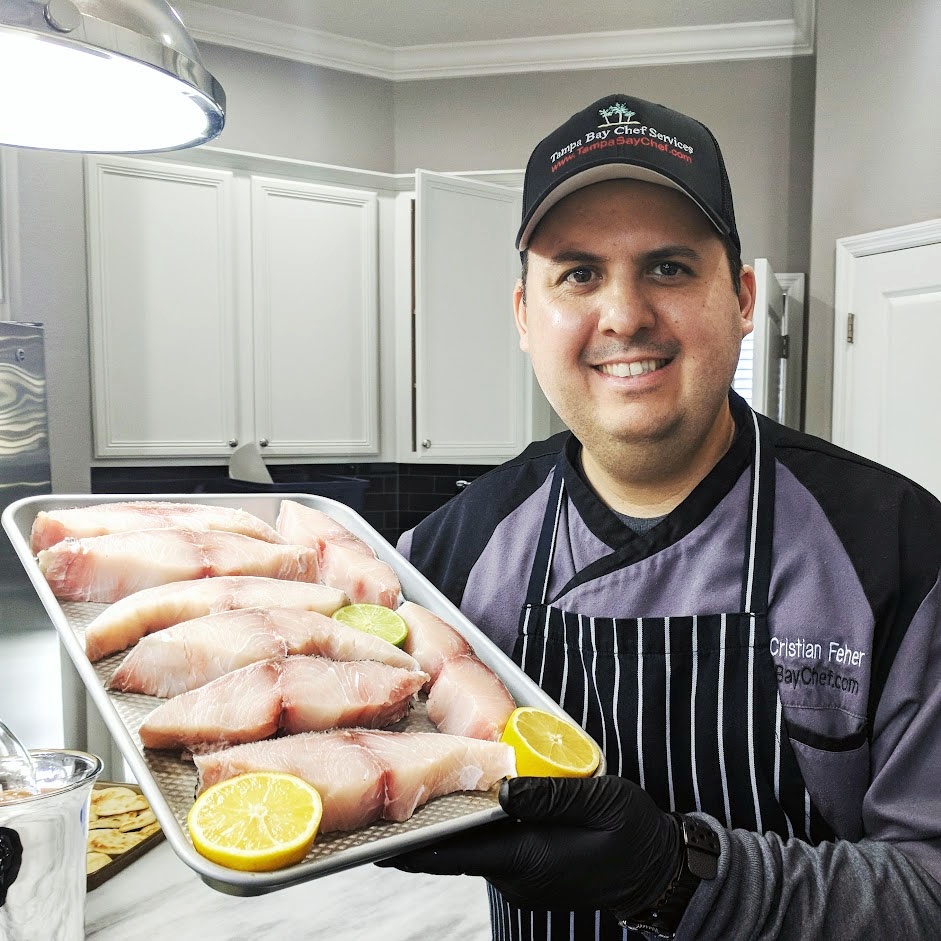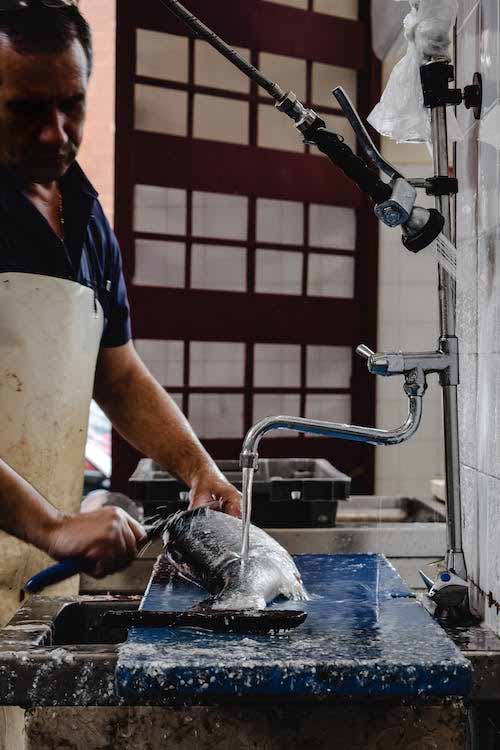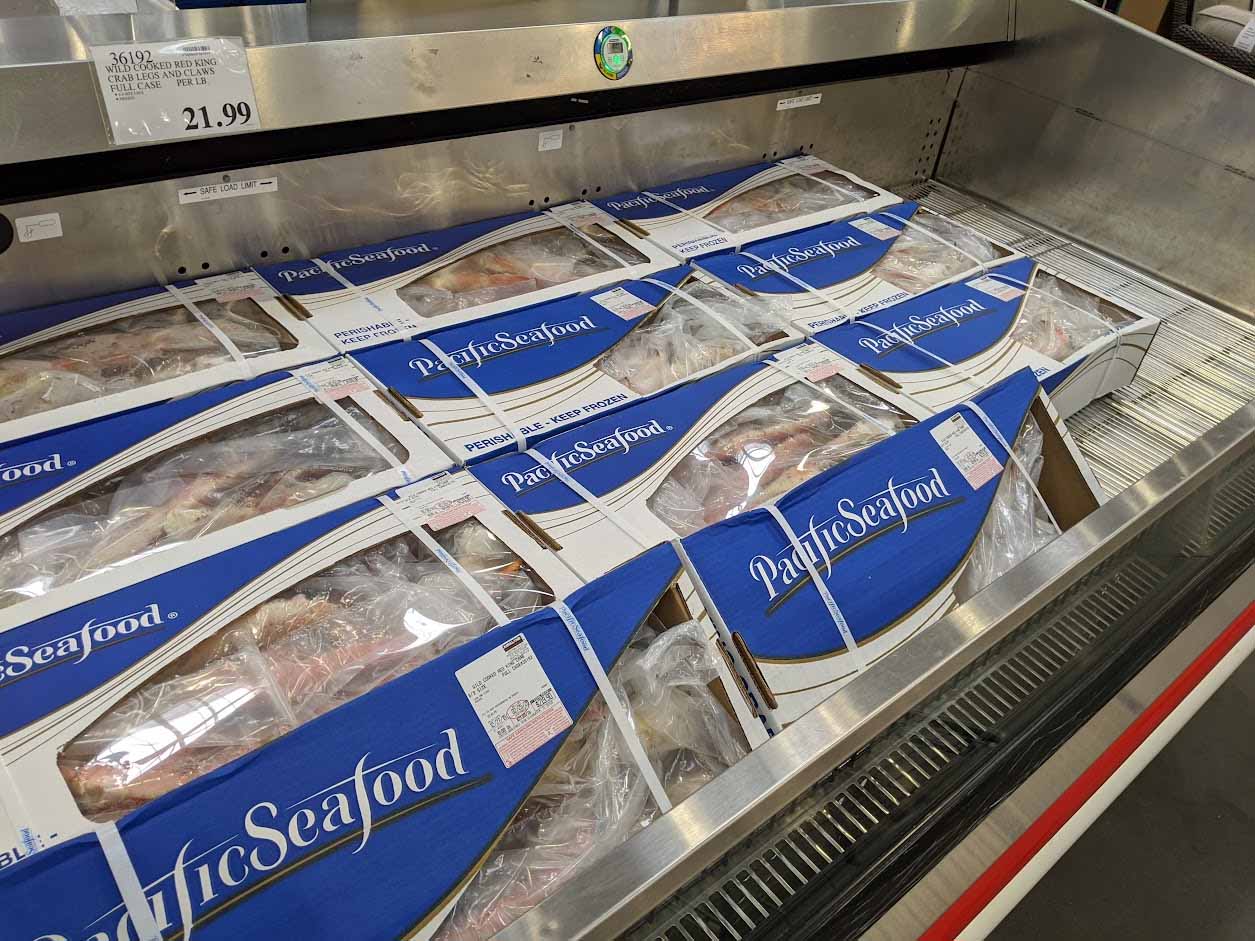How to Choose Fresh Fish and Seafood in Tampa Bay

Chef Cristian Feher – Tampa Bay Chef – with fresh Cobia from Florida © Tampa Bay Chef Services, LLC
Have you ever gone to a seafood store and bought yourself a seemingly fresh piece of fish, only to bring it home and discover that it’s spoiled? If the answer is yes, then this article is for you! Unfortunately, there have been several occasions where my customers go out and buy fish at local seafood stores and when they go to prepare themselves a delicious fish dinner, they find that their expensive fish smells so bad that it’s not even edible and they are forced to throw it in the trash. Yuck! This has happened to me as well.
What I often hear is, “Well, the guy at the seafood counter told me it was fresh!” I feel your pain. Unfortunately, this can be a common occurrence. I have been purchasing seafood in the Tampa Bay area for the last 15 years and I have a lot of experience in the fish-buying department. In this article, I will cover why they sell bad fish, how you can avoid buying bad fish, and I will also include my opinion on the seafood selection in the Tampa Bay area. Out of respect for local businesses, I will not name names.. but you know who you are!
Why do they sell bad fish in Clearwater, Tampa, and St. Pete?
 Before we get into why buying bad fish sometimes happens around here, let’s talk about fishmongers. A fishmonger is a trained professional who sells raw fish and seafood. They are specially trained at selecting fish before they purchase them from a supplier, and they are very skilled at handling, processing, and preserving fish.
Before we get into why buying bad fish sometimes happens around here, let’s talk about fishmongers. A fishmonger is a trained professional who sells raw fish and seafood. They are specially trained at selecting fish before they purchase them from a supplier, and they are very skilled at handling, processing, and preserving fish.
Fish have very delicate meat. As soon as a fish dies, the meat starts to break down very quickly. It has the shortest shelf-life of any type of animal meat available. Shellfish, like clams, oysters, crabs, shrimp, and scallops also have proteins that break down very quickly, but these little critters have the extra problem that their proteins can actually break down into toxins! While spoiled fish may or may not make you sick, spoiled shellfish can make you extremely sick. So, a fishmonger must be very skilled in selecting, quickly handling, and preserving the product to make it last as long as possible in a safe state before the customer buys it and takes it home. It takes a very caring, responsible, and skilled person to be a good fishmonger. I would say that a good fishmonger would be equivalent in aptitude and professionalism to a good pharmacist because they are both dealing with products that have a lot of potential to harm a person (even if just financially) if they are not carefully handled.
From my own observation, I have been to some seafood retailers in the Tampa Bay area where I did not feel very confident in the person handling my fish. I’m sorry if this offends some of you, but I have to be honest. The people who handle the fish are usually just “employees” who I’m sure are underpaid, and who are just there to do as little work as possible to get their hourly wage as they count down the seconds to clock out and go home – your average worker nowadays. I don’t see that many of these people are carefully trained in selecting and handling fish or seafood. And once they plop the product in the refrigerated case, they kiss the product goodbye and wash their hands of any further responsibility – they do not continue to monitor the product every couple of hours to ensure freshness. This happens at grocery stores, and large and small retailers as well. As time goes on, there are less and less fishmongers. Not very many of these professionals exist around here anymore. Your fishmonger has been replaced by unqualified employees.
I know this sounds like scathing criticism, and while I have not been to every seafood retailer in the area, this is what I have observed in some places. As a business owner I recognize that as Tampa, Clearwater, and St. Pete change and things become more expensive, the labor pool changes and it becomes more and more difficult to hire good, responsible, professional people that are able to do their jobs with skill and care. And also, businesses may overlook the worth of these positions and fail to offer enough money to really be able to create the position of a fishmonger. A good fishmonger should earn no less than the general manager of a business, for it is a skilled position that requires talent, intelligence, and responsibility. And I think that in many cases, executives, so far detached from handling food, do not even know what a fishmonger is, what a fishmonger does, and that their business (because they sell fish and seafood) actually requires a trained, professional, fishmonger. So it’s a systemic lack of awareness and communication in the local food industry.
I will mention that the employees in the fish department at Whole Foods in Clearwater are usually very patient with me and don’t give me a hard time when I scrutinize the fish before I buy it. So, I also want to give praise where it’s due.
How do you buy fresh fish in Clearwater, Tampa, and St. Pete?
 OK, so now that you might have to be your own fishmonger, here is a crash-course!
OK, so now that you might have to be your own fishmonger, here is a crash-course!
Selecting fresh fish requires a nose. And luckily, most of you have one! It is very simple to tell if fish is spoiled or not. You simply smell it. If it smells nice, you buy it. If it smells bad, you don’t. Simple as that. Did you know most people don’t smell fish before they buy it? And, did you know that I’ve never once seen an employee of a local fish retailer pick up a piece of fish and smell it before they sell it to me?
Every time I buy fresh fish or seafood, whether it offends the person selling the fish or not, I ask to smell it. They usually begrudgingly allow me to, and sometimes I have to turn it away because it’s not fresh. A professional fishmonger knows this and would have no problems letting you smell a piece of fish – they smell it themselves at least every few hours. But remember that you’ll most likely be dealing with an “employee” and unfortunately, some of them get offended when asked by a customer to smell the seafood. They feel you are accusing them of something. Some have actually prevented me from smelling the product stating that it’s for “food safety reasons I am not allowed to let you smell the fish!” Isn’t that something? Do not buy fish in a business that won’t let you smell it. That’s like buying a car without a road test.
If you’re in a big-box store, or grocery store that doesn’t have a “fish person” and the fresh fish is wrapped in clear plastic on one of those little foam trays, and you are intending to purchase a piece of fish, you may wish to poke a hole in the package without touching the fish, so that you can smell it. If it smells good, you can find someone and ask them to re-wrap it so that you can take it home, and if it smells bad you can give it to the store manager so they can dispose of it and (hopefully) they will take the rest of the spoiled fish and throw it out before someone makes the mistake of buying it.
There are other things that you can look for to spot fresh fish like, clear eyeballs, not too much slime, not too little slime, red gills, not purple or brown gills, etc etc. But the list can get long, and these are things that your fishmonger should have inspected before even putting the fish on the ice for you to look at. But to make it easy, since you may have to be your own fishmonger, smelling it will cover most bases. If you go by smell alone, you should be fine. I’ve never seen a spoiled piece of fish or seafood that both smelled good and was spoiled at the same time!
I do want to add that some fish may smell fine but have parasites and/or worms. And while this could be a whole other article, I will state the facts as concisely as I can. Cod and wild caught salmon, are two fish that I can think of, that can have worms that you can actually see with your eyes. Normally, close to the tail section of the fish. So, after you smell it, take a close look at it and see if you can spot any worms or anything moving. Other parasites may not be visible to the naked eye. But it’s recommended to cook fish to an internal temperature of at least 145°F (63°C) for a minimum of 15 seconds. This temperature is generally considered effective at killing parasites and harmful bacteria that might be present in the fish. And while you do not want to buy fish with worms, if you accidentally eat a worm that has been killed during the cooking process, you are safe!
Is frozen fish and seafood any good?

© Tampa Bay Chef Services, LLC
Yes! Frozen fish and seafood are great options. Fish and seafood processing is normally done in a way that the product is frozen very quickly after it has been caught. So, the amount of time that a piece of frozen product has been sitting there in a fresh temperature state is minute compared to how long “fresh” products sit out at the store before you buy them.
I am a very big proponent of frozen seafood products. and I actually prefer to use frozen products in many occasions. I have almost never gotten a bad piece of frozen fish or seafood (one time I bought a 10lb frozen tuna loin from a restaurant supplier and it was bad when I thawed it out). If done right, and normally it is done right, the process of IQF (individually quick freezing) seafood does not alter or depreciate the quality. What does lower the quality is preservatives. You might read the ingredients on a bag of frozen shrimp and you might see ‘tripolyphosphate’ or something like that. That chemical is used to preserve the product and turn it into a sponge that sucks up water instead of losing it (so that they can make more money when they sell it by weight). But, this chemical can often ruin the texture and flavor.
So, when you buy frozen seafood, just look at the ingredients, and as long as there are no chemicals used to preserve the product, I would recommend that you buy it and use it. Sometimes tuna may have carbon monoxide (or dioxide.. I can’t remember which) or ‘wood smoke’ but these are ok. These gases are used to keep the meat from turning brown. It does not alter the flavor or texture. And sometimes certain frozen products may have “salt” added, which in my experience is also fine and does not depreciate the quality of the fish or seafood.
Does the Tampa Bay area have the best seafood?

© Tampa Bay Chef Services, LLC
Selection of seafood really depends on two factors: What you can get locally, and how much someone is willing to pay for it.
Local commercially licensed fishermen in the Tampa Bay area are able to provide fresh snapper, flounder, sheepshead, blue crab, and shrimp, to name a few. And the two headliners that are heavily marketed are stone crab, which can be quite expensive, but good. And local grouper, which if you can get it within a few hours of being caught, can be one of the best fish you’ve ever tried. We have several customers throughout the year who go out fishing during the day with a local charter, and then bring the catch back home where I, or one of my chefs prepare it for them as part of an after-fishing-fine-dining event! And I can tell you that fresh-caught local grouper is absolutely delicious and has a very pleasing texture. I highly recommend it if you can find it. And if you would like for us to source it for you, we can help!
Supply and Demand for Seafood from the Gulf of Mexico
Commercial fisheries exist to make money. And different areas of the country (as well as consumers abroad) pay different amounts for fish and seafood. So, I think that very often our finest quality local seafood products are sold and shipped to consumers outside of Florida in other states and other countries, and we are often left with the medium-grade stuff. And I’m not saying this as a complaint or an accusation. I think everyone is entitled to make as much money as they can, and as a business owner myself, I understand the simple premise of supply and demand. If I could sell stone crab here for $10 per pound, or in Chicago or Toronto for $25+ per pound, I would probably start shipping to Chicago and Toronto. And I use these two cities as an example because those are two cities in which I was able to find much higher quality fish and seafood, on average, than here locally in the Tampa Bay area – with the exception of fresh local-caught grouper as mentioned above.
So, does the Tampa Bay area have good seafood? Yes! Absolutely it does. But do other cities have better quality seafood and more variety? I have to say, that factually, yes there are other cities, that are nowhere near the ocean, that do have better quality fresh seafood that comes from the Gulf of Mexico. And this is simply because retailers and consumers in that area are willing to pay more for the product than local Floridians.
What is the best place to buy fresh fish and seafood in Tampa, Clearwater or St. Pete?
If you have a boat, or you have a friend with a boat that likes to go fishing, that will be the best place to get fresh seafood! As mentioned above, there is nothing quite like fresh-caught Florida grouper.
Otherwise, the best place to get fresh fish and seafood in the Tampa Bay area is the place where 1) the fish looks fresh, 2) they sell it fast and quick and lots of it so it’s not sitting around geting spoiled, and 3) they let you smell and look at it before you buy it without getting upset with you or getting offended. Another tip I will give you is that if the fish is laying directly on ice, it’s better than when they have the fish sitting inside trays over the ice. The trays, in my opinion, collect juices and bacteria and actually insulate the fish from the ice (the fish cannot get as cold as it would with regular ice – which is not good). So, it’s better when the fish is directly in the ice and even partly buried in the ice. That’s where you want to buy fish. So, be observant, be NOSY, and you will get fresh fish every time!
And I will mention once again that you shouldn’t overlook frozen fish and seafood. As long as it is individually frozen and vacuum sealed (as in IQF) and properly packaged, and without any chemical preservatives, you can get a good quality product that is technically fresher than the “fresh” stuff that has been sitting at the store getting old by the minute.
This article was written by Chef Cristian Feher. It was not written using AI. If you like this article, please visit the main page of our blog to see all of the other articles.
